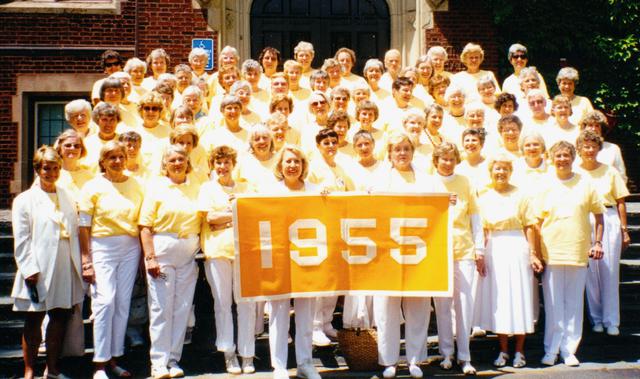IT was OUR 65TH!
1955's Class History (that would have been read)
We know you are looking at the class of 1955 and seeing very mature ladies, mostly in tennis shoes. However, we are looking at each other and seeing the shining faces of our freshman pals of 69 years ago; back to a time when freshman dorms were flourishing. Back to a time when we knew all our classmates, and sister classes were very important. Back to a time when we were called Miss and we called our teachers Mr. or Miss and when the thought of calling them by their first name would have brought on cardiac arrest.
Make no mistake, we were girls, not women, and we dated boys, not men; men were our fathers. Tuition, room and board cost $1650 back in 1951 and our starting salaries after graduation were in the $2000 range…for a year…not a week.
Diversity was not an issue. It didn’t exist. Neither did keys nor key cards to get into dorms. There were no locks on our room doors, and anyone could go in any building on campus. Of course each dorm had a student who “sat bells” to guard the chambers against any male anytime. Sitting bells and doing the dishes were required jobs we all had to do and were assigned each month. Our days seemed to be filled with song, especially the big sisters song, which we burst into at every occasion.
Each dorm had its own dining room, which was the center of our home away from home. Great conversations at every meal were a highlight of the day.
We had to wear skirts for dinner and stockings and heels on Wed. and Sundays. Our linen napkins were stored in named slots by the entrance to the dining room, and sometimes there was a bonus sample of free cigarettes in there too. Horrifying to think of now. Unfortunately, most everyone smoked and those that didn’t inhaled enough secondary smoke in the smokers during marathon bridge games to last them a lifetime. How so many of us are still alive is rather miraculous.
We preferred our communication face to face, rather than on face book, and we still do. Snail mail was an important part of our lives, and the one telephone per floor of each dorm did double duty. The college bought its first TV the end of our junior year. It was snowy black and white, of course, and was huge. Well, the cabinet was huge, but the screen was a mere 8 inches diagonally. We had 3 stations and the programming stopped at 9:00 pm. After that we watched the test patterns. As our sign says, “high tech for us was a slide rule.” We used a card catalog in the library and fountain pens that required ink.
We were introduced to temp doubles, which we were told, were temporary, the CI and all its calories, and were victims of the greatest academic hoax in history, if you will, …posture pictures. We went on blind dates and learned our Greek alphabet from fraternity pins. We had rules upon rules which we mostly didn’t question, and a judicial board that ruled over us if we strayed even a little. There are yellow cards in the archives which recorded everything about each of us: grades, SAT scores, height, weight and number of demerits each of us accumulated. Our parents received copies of our grades each semester.
We remember our years at Mount Holyoke as a turning point in our lives. Mount Holyoke gave us confidence to do our best and instilled upon us a love of learning that is still with us today. Most importantly it gave us lifelong friendships that are visible right here in Chapin Hall. It gave us wonderful memories to reflect on as we grow old.
I remember the first snow my Freshman year. A bunch of us were walking to the gym, and it was just getting dark. The campus looked so beautiful; it was a winter wonderland. We were singing “sleigh bells ring, are you listening…” and we were so happy to be with our new friends at this wonderful place. One of us said, “This is something that we will remember for the rest of our lives…and I have.”
Music to my ears!!! We asked for volunteers...and we got 'em!
How great is that?
Win Pettus Llosa is going to be our new Zoom Chairman.
We have lots of ideas about future programs thanks to emails from many of you. Perhaps programs from our Honoraries, perhaps smaller zooms with a theme, there is a whole new world out there for us to sample.
If you have special ...let us know.
Sue Nutter Keller and Sue Eckert Smith are going to be our new co-scribes!
If you go to the Quarterly Page you will see they are all set up
to receive news from all of you.
Now it's your turn...send us some news and pictures.
If anyone else would like to help out with the Class of 1955 we would love to hear from you.
Sign on to the Alumnae Association page at alumnae.mtholyoke.edu
and then click on Virtual Connection Opportunities to see this month's list of interesting presentations.
If you’re pondering a career shift, looking to learn a specific skill or just plain bored, consider a web-based class to broaden your horizons.
Free online classes can widen your knowledge and skill set, even if you don’t earn academic credit toward a degree.
Have extra time at home? Want to keep your brain busy with new things to think about? Consider doing a little remote learning of your own. After all, Benjamin Franklin famously set aside an hour or two each day to study, reflect and experiment so he could fill in the gaps in his own education, and he went on to several successful careers.
Hundreds of major colleges and universities offer online courses that anyone with an internet connection can take. While you won’t get academic credits for taking free classes, you expand your knowledge — and can even show a little solidarity with your children as they head back to school themselves. Here’s a guide to getting started.
Make a Plan
First, ask yourself what subject you want to study and how it might benefit you. Are you pondering a career shift? Looking to pick up new skills? Or do you just need a distraction in unsettled times? Make a note of your ultimate goal to help focus your search, as classes are available across a wide range of academic disciplines.
Fancy an Ivy League education? Among others, you can sign up for “Constitutional Interpretation” from Princeton, a course in African-American history from Yale or an introductory computer-science class from Harvard.
Studying online means you can attend from anywhere, so you can even go global, like a project-management class at Britain’s Open University or “The Science of Beer” from Wageningen University & Research in the Netherlands.
Find a Class
Many institutions offer lessons in the form of massive open online courses, also known as MOOCs. These mostly take place in your web browser and include recorded video lectures, readings, study questions and discussion forums.
Some schools, like the Massachusetts Institute of Technology, are generous. M.I.T. freely offers the content from most of its on-campus courses on its OpenCourseWare site.
To see what’s available from multiple schools, try Class Central, a search engine for online courses. You can also browse the Open Culture site, which lists more than 1,500 courses from accredited institutions and hosted on educational platforms like Coursera, edXand FutureLearn; these platforms have many subscription or fee-based classes as well.
Click the enroll button to sign up. If you’re on the “free” plan, you’re essentially auditing the course. However, if you pay a fee, you can often get graded assignments — or a “certificate of completion” that typically starts around $50.
Other Sources for Courses
If you’re not quite ready for a college-level class or wish to supplement your child’s learning, the nonprofit Khan Academyhosts lessons designed for students in kindergarten through 12th grade. Here, you can find math, science, economics and humanities classes, as well as inventive computer courses like “Pixar in a Box,” an overview of the digital-animation process.
Apple’s iTunes U service hosts free audio and video lectures from schools around the world, although the company has announced plans to discontinue the platform at the end of 2021.
Get Ready for School
An hour a day of study is a sensible goal, but when considering a course, check its specific duration and time commitments so you can plan more precisely and slot the space into your calendar. Some classes are self-paced, while others have a more traditional meeting structure that can last for nine weeks.
Classes for Busy People
Too busy to commit to a lengthy course? The Coursera site has a list of courses you can complete in a day; all are free until the end of the year.
And consider the lectures and webinars offered by museums and libraries. The Museum Computer Network site has a lengthy list of online learning resources from major institutions. Browsing your favorite museum sites directly for educational content can also yield results.
Life Lessons
Want to know how to change the oil in a late-model Honda Civic, perform basic toilet repairs or mend torn clothes? Instructional videos posted to YouTube provide a hands-on education on the practical matters of daily living. Many popular do-it-yourself sites have their own YouTube channels, so you can find content like The Handyman’s home-improvement tutorials or iFixit’s gadget-repair videos in one place.
And if you’d like to upgrade your home-cooking repertoire, fire up a recipe search on the site. YouTube chefs will guide you through making red velvet waffles and chicken or even the infamousTwinkie wiener sandwich, because with school in session, the fall comfort-food season is right around the corner.
Ideas for virtual learning!
But as you well know...it didn't happen!
Below are a few ideas for going back to class virtually just like the students!
Below that is some class news and then our
Class History which would have been read at Reunion.

